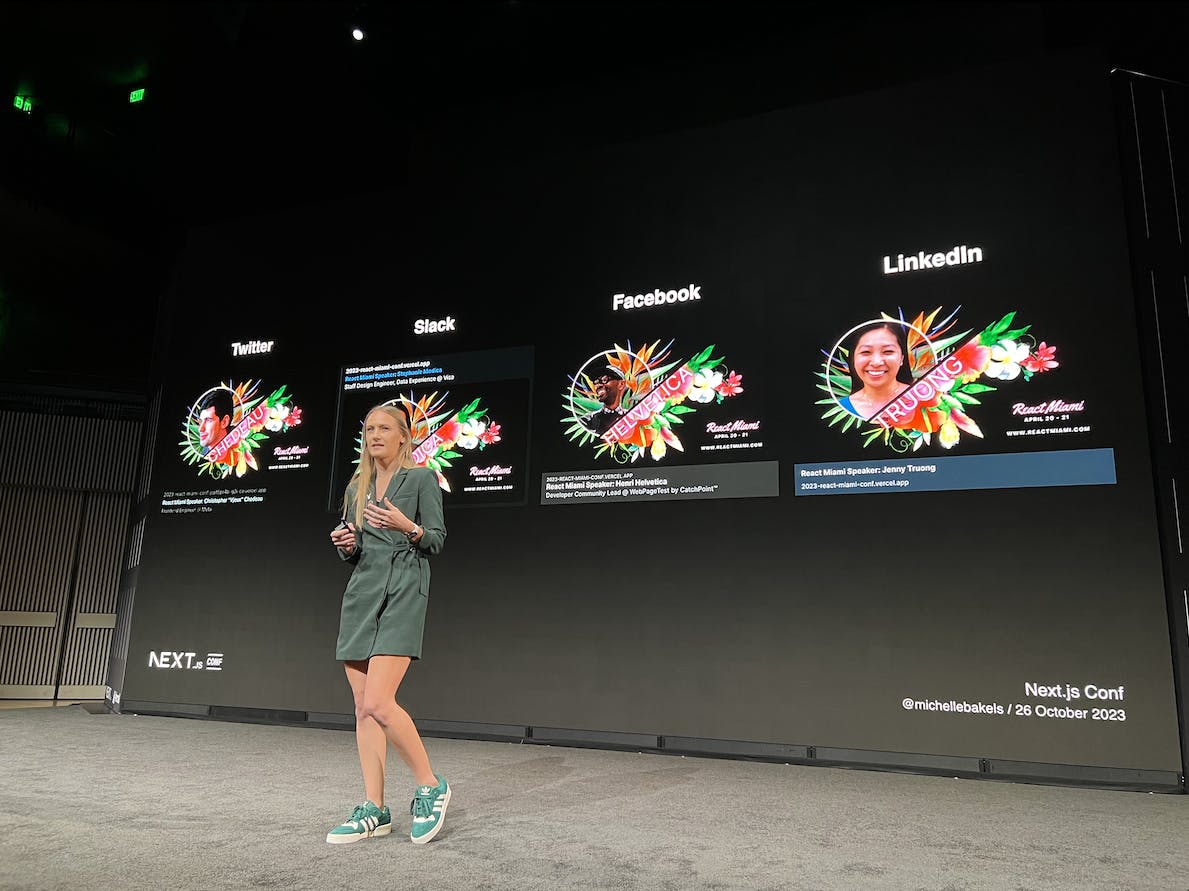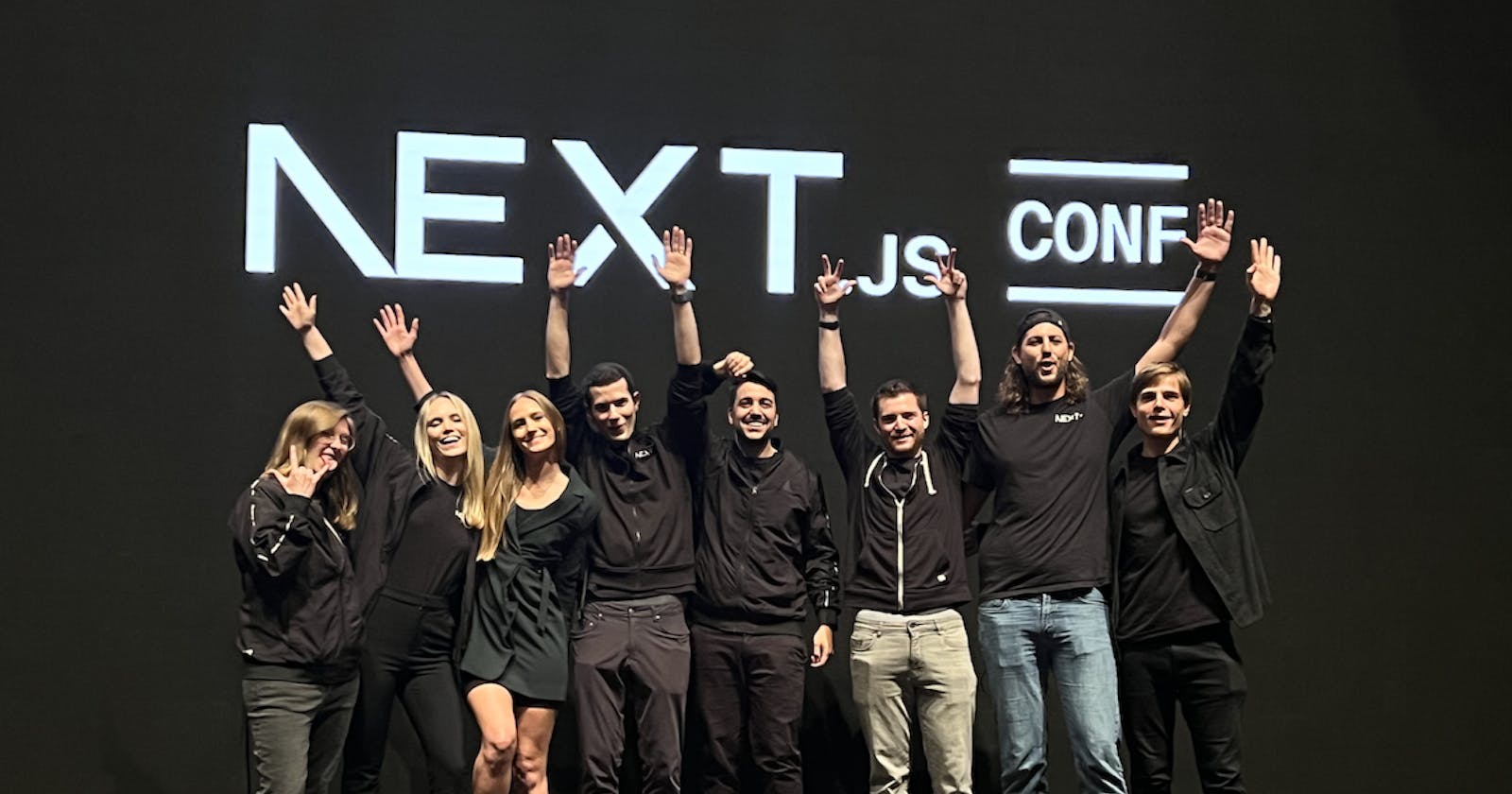Last month, I was invited to speak at Next.js Conf about how I use Next.js and Vercel to organize React Miami.
The full talk can be viewed here:
Even though I don't speak at conferences often, I got a lot of compliments on my talk (thank you!) and I think it went well! In fact, this was the first time I'd ever really enjoyed giving a conference talk and felt happy with how it went.
I want to share two specific things that I believe made the biggest difference in ensuring the talk was well-received and a positive experience.
The Story Spine
The majority of time creating my talk was spent on shaping the story -- specifically in the style of The Story Spine (aka The Pixar Method).
![Once upon a time there was [blank]. Every day, [blank]. One day [blank]. Because of that, [blank]. Until finally [bank]. The Story Spine — Emma Coats](https://cdn.hashnode.com/res/hashnode/image/upload/v1701292613485/5f787229-9426-4306-98be-f74e9971a7ff.webp?auto=compress,format&format=webp)
This structure is extremely familiar to us. Not only do we see it in movie after movie, but we've been exposed to it since we were babies. For millennia, this is how humans have shared important generational wisdom for survival. Aside from being entertaining, it provides the audience a way to quickly connect to your talk since this specific song and dance is subconsciously understood.
However, it's not easy to mold your thoughts, knowledge, and experiences into a neat, little template (especially for a professional conference talk). Life rarely feels so organized like this.
Trying to fit what you want to share with the audience in this storytelling method can feel disingenuous, and perhaps even self-important. You're a web developer organizing a conference, not a knight slaying dragons, it's really not that deep.
However, in reality, any sufficiently challenging achievement is riddled with the peaks and valleys required by the Pixar Method. The more difficult task now becomes recalling all the things that didn't work, the challenges you faced, and the small achievements along your journey to success.
Another challenge is that this template forces you to admit a lot of shortcomings and failures. If you only have 20 minutes to share everything you know about a topic, and you want to be seen as a subject matter expert, then why waste time confessing your faults?
Well, it's simply more interesting. Ultimately you want the audience to walk away with new knowledge (preferably not about how much you suck). Layering information into a story structure provides cues for what the audience should be listening for. Listeners can tell by the rhythm of the story when the main character (you, the speaker) is about to achieve a win (important talk takeaway!), while also understanding, and relating to, the struggles in between (also informative!).
Allocate a generous amount of time to the "storyboard" of your talk, and the subsequent pieces will all fall into place.
Gratitude
I've attended, spoken at, and organized many events and conferences and I've never met anyone who wasn't nervous when they first started speaking. When I presented at previous events I was so sick with nerves I could barely move or speak. I felt so honored to be invited to give a talk at a conference, I put countless hours into perfecting my presentation, and the moment it all came to fruition I felt absolutely awful. The entire experience that I worked so hard for was marred by my fear of failure, embarrassment, and judgment.
It wasn't until I organized React Miami that my perspective shifted. The first year of our event was overwhelming and I was afraid my inexperience would cause attendees and speakers to regret being a part of the conference. At the height of my anxiety, a speaker approached me about how nervous they were to speak. I was stunned!
Nervous?? How could they be nervous? They made it through a rigorous selection process and now people from around the world are here to see them, learn from them, and applaud them -- plus it'll be over in 20 minutes! This seems like it would be a moment for celebration!
It took me approximately 2 seconds to remember that all of these things were true for me too when I spoke at conferences, and yet I ruined each experience for myself by focusing on the worst possible outcomes. Aside from this epiphany, this confession was what I needed to refocus my energy where it mattered, making sure everyone attending and speaking was comfortable, happy, and safe.
Ironically, by being struck with anxiety about all the things that could go wrong, I was increasing the likelihood of those things actually happening since it was draining my energy and focus away from executing my job well.
From that moment I promised myself I'd never be nervous about a conference talk again. Easier said than done, but this time I had a tool for combating those nerves -- gratitude.

Instead of ruminating on thoughts of failure, I constantly reminded myself how thankful I was to be accepted as a speaker. How it was such an honor for my work, effort, and knowledge to be recognized by people I respect. How moments like these are infrequent for me, and this event will come and go before I realize it.
Before walking on stage at Next.js Conf, in front of hundreds of people in person and thousands streaming online, I said to myself "I can't believe I get to be here right now. I can't believe I get to do this. I'm so lucky and I'm so excited! I can't wait to do this!"
And it worked! It worked before stepping on stage, it worked the nights before when I'd start to get nervous and couldn't sleep, and it worked when I began doubting if my talk was actually any good.
I also recalled my lesson from React Miami. If I was overcome with fear on stage, then how could I present myself to the audience as confident/relaxed/collected? I had to remember that my fears would only make the things I was afraid of more likely to come true, and to prevent that from happening I had to assume a mindset of success.
Practicing gratitude was unbelievably simple and incredibly effective in turning a typically scary experience for me into one of my best memories.
In Closing
I'm still learning how to be an effective speaker, but for the first time, I finally felt proud and happy with how one of my talks went. This is undeniably attributed to two major changes in how I approached the presentation:
Shaping the talk into a Spine Story template.
Focusing on gratitude instead of fear.
Hopefully, this can help a few other timid speakers out there. Feel free to leave any questions here or find me on Twitter @ michellebakels!
